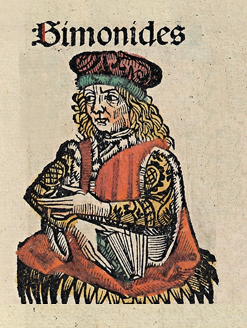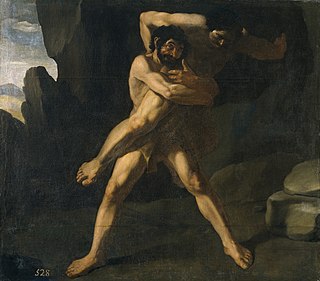Related Research Articles
This article concerns the period 479 BC – 470 BC.

Bacchylides was a Greek lyric poet. Later Greeks included him in the canonical list of Nine Lyric Poets, which included his uncle Simonides. The elegance and polished style of his lyrics have been noted in Bacchylidean scholarship since at least Longinus. Some scholars have characterized these qualities as superficial charm. He has often been compared unfavourably with his contemporary, Pindar, as "a kind of Boccherini to Pindar's Haydn". However, the differences in their styles do not allow for easy comparison, and translator Robert Fagles has written that "to blame Bacchylides for not being Pindar is as childish a judgement as to condemn ... Marvell for missing the grandeur of Milton". His career coincided with the ascendency of dramatic styles of poetry, as embodied in the works of Aeschylus or Sophocles, and he is in fact considered one of the last poets of major significance within the more ancient tradition of purely lyric poetry. The most notable features of his lyrics are their clarity in expression and simplicity of thought, making them an ideal introduction to the study of Greek lyric poetry in general and to Pindar's verse in particular.
Aegimius was the Greek mythological ancestor of the Dorians, who is described as their king and lawgiver at the time when they were yet inhabiting the northern parts of Thessaly.
In Greek mythology, Euphemus was counted among the Calydonian hunters and the Argonauts, and was connected with the legend of the foundation of Cyrene.

Simonides of Ceos was a Greek lyric poet, born in Ioulis on Ceos. The scholars of Hellenistic Alexandria included him in the canonical list of the nine lyric poets esteemed by them as worthy of critical study. Included on this list were Bacchylides, his nephew, and Pindar, reputedly a bitter rival, both of whom benefited from his innovative approach to lyric poetry. Simonides, however, was more involved than either in the major events and with the personalities of their times.
HieronI was the son of Deinomenes, the brother of Gelon and tyrant of Syracuse in Sicily, from 478 to 467 BC. In succeeding Gelon, he conspired against a third brother, Polyzelos.

Antaeus, known to the Berbers as Anti, was a figure in Berber and Greek mythology. He was famed for his defeat by Heracles as part of the Labours of Hercules.

Pindar was an Ancient Greek lyric poet from Thebes. Of the canonical nine lyric poets of ancient Greece, his work is the best preserved. Quintilian wrote, "Of the nine lyric poets, Pindar is by far the greatest, in virtue of his inspired magnificence, the beauty of his thoughts and figures, the rich exuberance of his language and matter, and his rolling flood of eloquence, characteristics which, as Horace rightly held, make him inimitable." His poems can also, however, seem difficult and even peculiar. The Athenian comic playwright Eupolis once remarked that they "are already reduced to silence by the disinclination of the multitude for elegant learning". Some scholars in the modern age also found his poetry perplexing, at least until the 1896 discovery of some poems by his rival Bacchylides; comparisons of their work showed that many of Pindar's idiosyncrasies are typical of archaic genres rather than of only the poet himself. His poetry, while admired by critics, still challenges the casual reader and his work is largely unread among the general public.

The Pythian Games were one of the four Panhellenic Games of Ancient Greece. They were held in honour of Apollo at his sanctuary in Delphi every four years, two years after the Olympic Games, and between each Nemean and Isthmian Games. The Pythian Games were founded sometime in the 6th century BC. In legend they were started by Apollo after he killed Python and set up the Oracle at Delphi. They continued until the 4th century AD.
In Greek mythology, Minyas was the founder of Orchomenus, Boeotia.
Gelon also known as Gelo, son of Deinomenes, was a Greek tyrant of the Sicilian cities Gela and Syracuse, Sicily, and first of the Deinomenid rulers.

Tinjis was a Libyan queen as the wife of King Antaeus in Berber and Greek mythology, and some kind of a female deity.

Theron, son of Aenesidemus, was a Greek tyrant of the town of Acragas in Sicily in Magna Graecia from 488 BC. According to Polyaenus, he came to power by using public funds allocated for the hire of private contractors meant to assist with a temple building project, to instead hire a personal group of bodyguards. With this force at his disposal, he was able to seize control of the town's government. He soon became an ally of Gelo, who at that time controlled Gela, and from 485 BC, Syracuse. Gelo later became Theron's son-in-law.
Arcesilaus IV of Cyrene was the eighth King of Cyrene and last king of the Battiad dynasty. He served as a client king under Persian authority.

The Aleuadae were an ancient Thessalian family of Larissa, who claimed descent from the mythical Aleuas (Ἀλεύας). The Aleuadae were the noblest and most powerful among all the families of Thessaly, whence Herodotus calls its members "rulers" or "kings" (βασιλεῖς).
In Greek mythology, Aegeus is the eponymic hero of the phyle called the Aegeidae at Sparta. He was a son of Oeolycus, and grandson of Theras, the founder of the colony in Thera. All the Aegeïds were believed to be Cadmeans, who formed a settlement at Sparta previous to the Dorian conquest. There is only this difference in the accounts, that, according to some, Aegeus was the leader of the Cadmean colonists at Sparta, while, according to Herodotus, they received their name of Aegeids from the later Aegeus, the son of Oeolycus. There was at Sparta a heroon of Aegeus.
Pherenikos was an Ancient Greek chestnut racehorse victorious at the Olympic and Pythian Games in the 470s BC. Pherenikos, whose name means "victory-bearer", was "the most famous racehorse in antiquity". Owned by Hieron I, tyrant of Syracuse, Pherenikos is celebrated in the victory odes of both Pindar and Bacchylides.
In Greek mythology, Arsinoe, sometimes spelled Arsinoë,, was the name of the following individuals.
Pindar's First Pythian Ode is an ancient Greek epinicion praising Hiero of Syracuse for a victory in the Pythian Games. It was to be sung at a grand musical festival, celebrating Hiero of Syracuse's achievements and the founding of the new city, Aetna. Most of Pindar's signature characteristics and signature style appear in this poem. Pindar utilizes religion, local mythology, and his poetic genius to create an ode that outlasts the occasion itself. The motif of the ode is harmony: harmony of the lyre and moral harmony of a life formed by justice, liberality, and the pleasure of the gods. The one follows the other and link together as one true source of imperishable honor of a man.
Olympian 2, 'For Theron of Acragas', is an ode by the 5th century BC Greek poet Pindar.